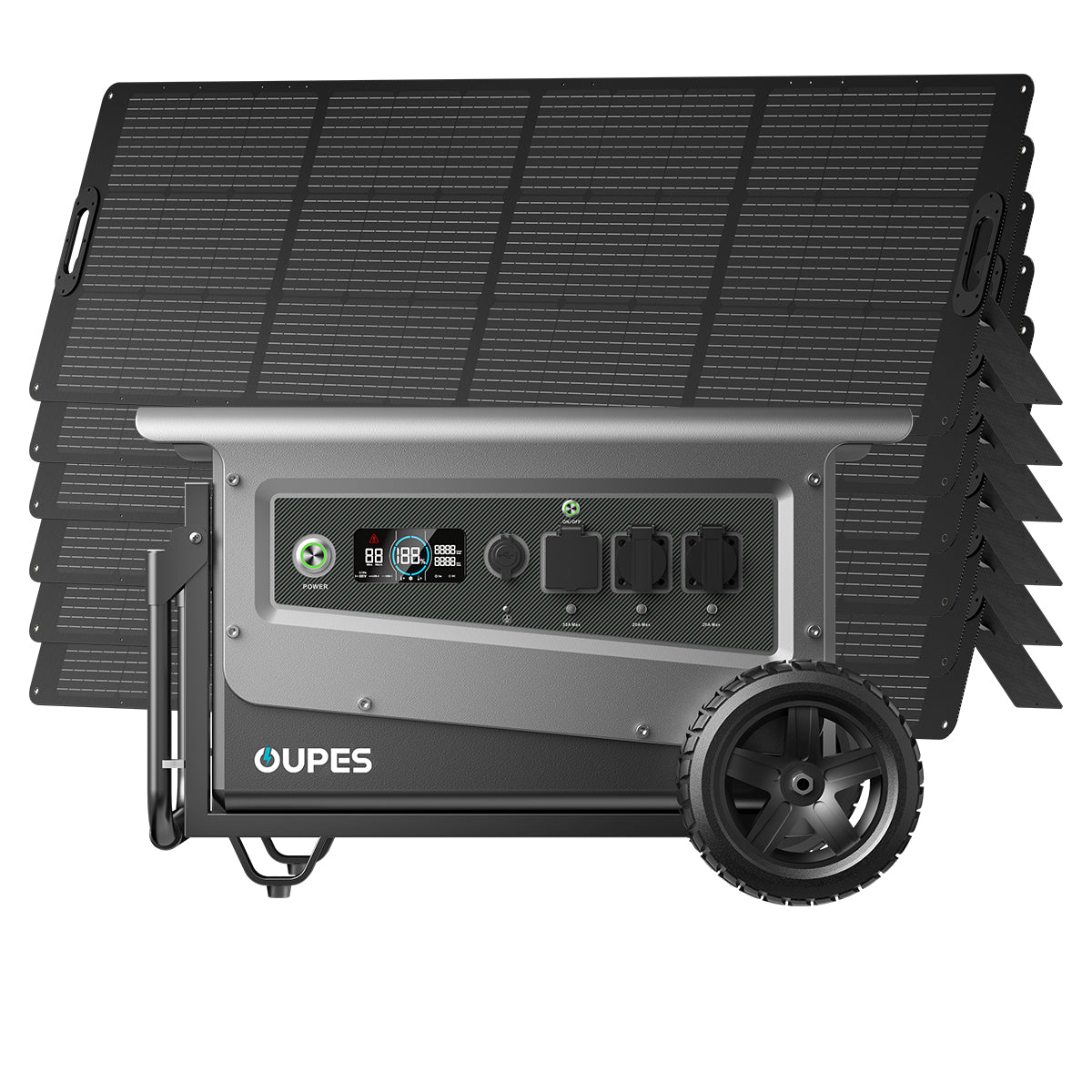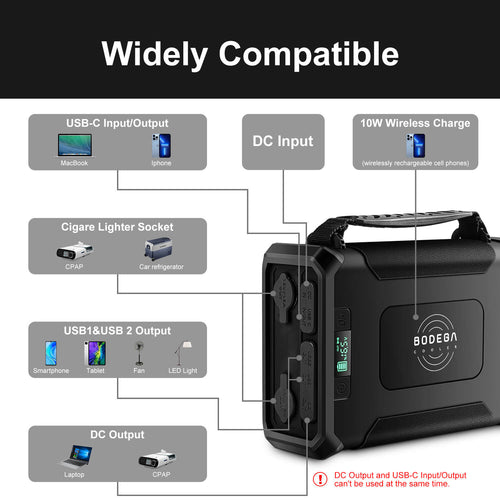Disclosure: This post contains affiliate links and I will be compensated if you make a purchase after clicking through my links. Learn More
Yes, a portable power station can run a refrigerator. But it depends on the power capacity.
Most refrigerators need a constant power supply. So, it’s crucial to check the power station’s wattage. In today’s world, portable power stations are gaining popularity. They are handy for outdoor events, camping trips, or emergencies. Many wonder if these devices can power essential appliances like refrigerators.
The answer lies in understanding the power requirements and capacity. Refrigerators typically require a steady power source. So, the power station must have enough wattage and runtime. Considering these factors helps in choosing the right power solution. This post explores how you can effectively use a portable power station for running a refrigerator. It provides insights into power needs and practical tips for usage.

Introduction To Portable Power Stations
Portable power stations are increasingly popular for their versatility. These compact devices offer reliable power in various settings. Whether camping or facing a power outage, they provide essential electricity. Many wonder if these stations can power major appliances like refrigerators. Understanding their functionality is key. Let’s explore what portable power stations are and how they work.
What They Are
A portable power station is a compact battery-powered device. It stores electrical energy for later use. Typically, it includes a lithium-ion battery. This technology ensures efficient power storage. The device usually features multiple output ports. These ports accommodate different types of plugs. Some models even support solar charging. This makes them eco-friendly and versatile.
How They Work
Portable power stations convert stored energy into usable electricity. They use an inverter to change DC to AC power. AC power is what most home appliances use. When you plug a device into the station, it draws power from the battery. The station regulates the energy flow. This ensures stable power output. Advanced models offer smart technology features. These enhance energy management and efficiency.
Understanding Refrigerator Power Needs
A portable power station can run a refrigerator, but check the wattage requirements first. Most refrigerators need around 700 watts. Ensure the power station’s capacity matches this need for proper functioning.
Understanding how refrigerators consume power is essential. This knowledge helps in determining if a portable power station can run a refrigerator. While refrigerators are essential in every home, their power needs vary. Let’s dive into the specifics.
Typical Power Consumption
Refrigerators typically use between 100 to 800 watts. This range depends on size and model. Smaller units consume less power than larger ones. Energy-efficient models also use fewer watts. Always check the manufacturer’s label for exact numbers.
Surge Power Considerations
Refrigerators need more power at startup. This surge can be two to three times the running watts. For example, a 200-watt fridge might need 600 watts at start. Portable power stations should handle this surge. Otherwise, the refrigerator might not start. Check your power station’s surge capacity.
Matching Power Station Capacity
Matching the capacity of a portable power station to run a refrigerator can be a game-changer for those who love camping or live in areas prone to power outages. But how do you ensure your power station is up to the task? Understanding the power requirements and battery capacity is crucial. Let’s dive into the details to get you equipped with the knowledge you need.
Calculating Power Requirements
Before you connect your refrigerator, you need to know its power consumption. Look at the label or manual for its wattage. Most refrigerators use between 100 to 800 watts. You might be surprised that not all refrigerators require the same power. A compact fridge will demand less power than a large freezer.
Consider the startup power as well. Refrigerators typically need more power to start than to run continuously. This surge can be two to three times the running wattage. Have you ever noticed a flicker in lights when the fridge kicks on? That’s the surge.
Battery Capacity And Runtime
Your portable power station’s battery capacity is measured in watt-hours (Wh). This tells you how much energy it can store. If your refrigerator uses 300 watts, a 1000 Wh power station could theoretically run it for about three hours. But, factors like efficiency and external conditions can affect this.
Runtime depends on how often the refrigerator runs its compressor. A fridge might not run continuously. It cycles on and off to maintain temperature. Have you ever felt relieved when the humming stops? That’s your fridge saving power.
Check if your power station has an inverter. It should convert DC to AC efficiently. A good inverter ensures minimal energy loss. Have you ever thought about what happens when you plug in a device? The inverter does the magic.
So, can a portable power station run your refrigerator? Yes, if you match the power capacity correctly. Are you ready to face the next power outage with confidence? Equip yourself with the right knowledge and tools!

Credit: www.bodegacooler.com
Types Of Portable Power Stations
When considering whether a portable power station can run a refrigerator, understanding the types of power stations available is crucial. Different technologies offer varied capacities and efficiency levels, impacting your choice for home or travel use. Let’s delve into some of these options to better equip you to make an informed decision.
Lithium-ion Options
Lithium-ion power stations are popular for their lightweight and compact design. They provide high energy density, meaning they store a lot of power in a small package. This makes them ideal for camping trips or emergency backup.
One major advantage is their fast charging capability. Imagine you’re at a campsite and your power station runs low; a lithium-ion unit can be recharged quickly, ensuring your refrigerator keeps running smoothly.
However, they can be more expensive than other options. You might pay a bit more upfront, but the convenience and efficiency could make it worth the investment.
Lead-acid Alternatives
Lead-acid power stations are a more traditional choice. They tend to be bulkier and heavier but come with a lower price tag. If weight is not an issue and you’re on a budget, this option might appeal to you.
These units are known for their reliability. Think of them like an old trusty car; they may not be flashy, but they get the job done. They can support a refrigerator, especially in short-term power outage situations.
However, they take longer to charge and have a shorter lifespan compared to lithium-ion options. This means you’ll need to plan your usage and charging schedule carefully to avoid any inconvenience.
Choosing the right portable power station depends on your specific needs and circumstances. Are you more focused on portability or cost? How often will you need to use it? By understanding these types, you can select a power station that ensures your refrigerator runs smoothly, wherever you are.
Key Features To Consider
Consider battery capacity and power output when using a portable power station for a refrigerator. Check compatibility with your fridge’s wattage. Look for features like inverter technology and multiple outlets to ensure reliable performance.
When considering a portable power station to run a refrigerator, it’s crucial to focus on specific features. These features ensure that your fridge operates efficiently, without any hiccups, even in unexpected power outages. Understanding these can save you from a warm fridge and spoiled food.
Inverter Efficiency
Inverter efficiency is a game-changer in the world of portable power. A high-efficiency inverter converts power from the battery to a form that your refrigerator can use.
Look for an inverter with a pure sine wave output, as it mimics the power from a wall outlet. This ensures smooth operation and protects your fridge from damage.
Always check the inverter’s wattage capacity. Make sure it matches or exceeds your refrigerator’s power requirements. This ensures your fridge runs without interruption.
Port Options And Outputs
The number and type of ports available in a power station can greatly impact its versatility. You’ll want a model with multiple AC outlets, especially if you plan to power other devices alongside your refrigerator.
Some power stations come with USB and DC ports. These are handy for charging gadgets, providing added convenience during power outages.
Consider the ease of access to these ports. It’s essential to have a user-friendly design, so you aren’t fumbling around in the dark trying to connect your fridge.
Choosing the right portable power station can feel daunting. But by focusing on these key features, you can make a decision that ensures your refrigerator stays running smoothly.
Have you checked if your current power station meets these criteria? If not, it might be time to reassess your options.

Testing A Portable Power Station
Testing a portable power station involves evaluating its ability to run appliances. A refrigerator is one of the most demanding appliances in a household. To ensure a portable power station can effectively power it, real-world testing is essential. Understanding the station’s capacity and limitations helps in making informed decisions.
Real-world Scenarios
In real-world scenarios, a portable power station must handle varying power loads. Refrigerators cycle on and off, creating power surges. The station needs to manage these fluctuations efficiently. Observing its performance during these cycles reveals its true capability. Using different refrigerators gives varied insights into power requirements.
Common Challenges
Common challenges include battery depletion and insufficient power output. A refrigerator consumes significant energy, straining the power station. Long-term usage can lead to power drain, causing interruptions. Testing helps identify these issues, allowing for proper adjustments. Ensuring the station has enough wattage is crucial for seamless operation.
Benefits Of Using A Power Station
A portable power station can run a refrigerator during power outages. It offers a reliable backup solution. These devices provide peace of mind. They’re compact and user-friendly. Ideal for emergencies or outdoor adventures.
Harnessing the power of a portable power station to run a refrigerator is not just about convenience; it’s a game-changer for modern living. As our world becomes increasingly mobile, the need for reliable and flexible power sources grows. Imagine going on a camping trip and still having the luxury of fresh food. Or think about how a power outage wouldn’t mean losing everything in your fridge. Let’s delve into the practical benefits of using a power station.
Portability And Convenience
Portable power stations offer unparalleled convenience. They are designed to be easy to carry, making them perfect for outdoor adventures or emergency situations. You can transport them to your campsite or simply keep them at home for peace of mind.
Their compact design means they fit easily in your car or RV. You can set up your fridge anywhere you like, without worrying about finding a power outlet. This flexibility allows you to focus on enjoying your surroundings rather than logistics.
Environmental Impact
Using a portable power station can significantly reduce your environmental footprint. Many power stations are equipped with solar charging capabilities. This means you can harness renewable energy to power your fridge, reducing reliance on fossil fuels.
Think about the long-term benefits. By choosing a power station, you’re contributing to a cleaner planet. Not only do you save on electricity bills, but you also make an eco-friendly choice that supports sustainable living.
Consider the impact of your choices. Wouldn’t it be empowering to know that your mobile power solution is part of a larger environmental effort?
Limitations And Considerations
Using a portable power station for a refrigerator sounds convenient. Yet, certain limitations and considerations must be noted. Not all power stations have the same capacity. The size and power of your refrigerator matter. Let’s explore the key factors you need to keep in mind.
Cost Factors
Portable power stations vary in price. High-capacity models can be expensive. You should compare costs with potential savings. Some might find it cheaper to use traditional power sources. Check if the investment matches your budget. Consider long-term benefits versus the upfront cost.
Maintenance And Longevity
Portable power stations require regular maintenance. Batteries degrade over time. Proper care can extend their life. Follow manufacturer guidelines for maintenance. This ensures the power station runs efficiently.
Consider longevity when choosing a power station. A durable model can last years. Some models have replaceable parts. This can add to their longevity. Always research before buying. Ensure it meets your refrigerator’s needs.
Frequently Asked Questions
What Size Portable Power Station Do I Need To Run A Refrigerator?
To run a refrigerator, choose a portable power station with at least 1000W continuous output. Check your fridge’s wattage requirements to ensure compatibility. Consider battery capacity and runtime for uninterrupted operation. A unit with higher wattage and larger battery ensures longer use and efficiency.
Can You Run A Refrigerator On A Power Station?
Yes, you can run a refrigerator on a power station. Ensure the power station has enough wattage capacity. Check the refrigerator’s energy requirements and compatibility with the power station’s output. Using a power station with sufficient capacity ensures uninterrupted operation of your refrigerator.
How Long Will A Jackery 1000 Run A Refrigerator?
A Jackery 1000 can run a refrigerator for approximately 7 to 10 hours. This duration depends on the refrigerator’s power consumption and efficiency. Always check the fridge’s wattage to calculate more accurately.
What Size Generator Do I Need To Run A Refrigerator?
To run a refrigerator, choose a generator with at least 2,000 watts. Consider the fridge’s starting wattage, which can be higher. Always check the appliance’s manual for exact power needs. This ensures efficient and safe operation, preventing overloads.
Final Words
Choosing the right portable power station can be tricky. It depends on your refrigerator’s power needs. Most power stations can run small fridges. Larger fridges need a powerful unit. Check the wattage before buying. Battery capacity matters too. Longer run times require bigger batteries.
Portable power stations offer convenience. You can use them in emergencies. Also handy for camping trips. Always research before making a purchase. This ensures you get the best fit. Keep safety in mind. Proper usage extends your power station’s life.
Consider all factors carefully. Make an informed decision.








